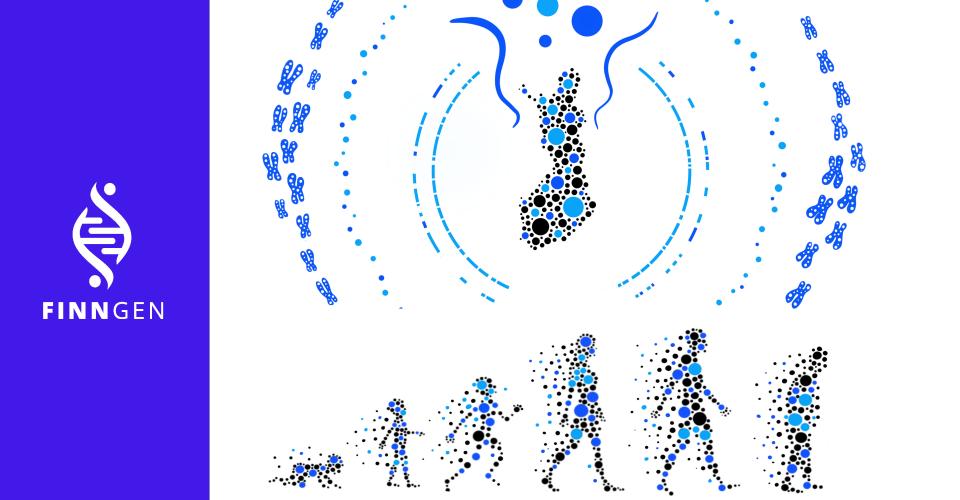The power of a genetic isolate: Hundreds of novel genetic discoveries from the FinnGen study

Since initiation in 2017, the FinnGen study has developed into one of the world’s leading biobank-based genomic research projects. Currently FinnGen is completing the construction of a resource that integrates genomic information from 500,000 Finns with more than half a century of national health registry data.
The FinnGen flagship study, just published in Nature, is a convincing demonstration of the opportunities unique to Finnish health data, population structure, legislative frameworks and biobanking organization that in combination exist nowhere else.
Here the FinnGen team describes results based on 224,737 Finnish biobank participants. After performing comprehensive genetic analyses for more than 1,900 diseases, the researchers identify almost 2,500 genomic regions that are linked with at least one of these diseases.
“Even with less than half of the recruited 500,000 participants analyzed at this stage, this snapshot of results describes a wealth of important genetic discoveries emerging from FinnGen, including novel risk and protective variants for both common and rare diseases”, says FinnGen Scientific Director, Professor Aarno Palotie from the Institute for Molecular Medicine Finland FIMM, University of Helsinki.
Finland’s health registers and biobanks provide unique opportunities
In Finland, health information such as medical diagnoses, procedures and drug prescriptions are captured for many decades in national electronic health registers for the entire population. This creates unique research opportunities.
In the flagship publication, the team first demonstrates that with skillful utilization of such register data, the health history of the study participants can be reliably composed and studied. For this, the authors compare the FinnGen results with earlier genetic findings for 15 previously well-studied common diseases, such as type 2 diabetes, asthma and Alzheimer’s disease.
In addition to verifying the validity of register data, the researchers show that identification of novel risk variants in FinnGen is possible with a much smaller number of patients compared to the largest published disease-specific genetic studies.
“The Finnish health registers containing health and medication data throughout an individual's lifetime, allowed us to rapidly and accurately identify disease cases. This accurate phenotyping, coupled with Finnish population history is a very powerful combination for novel genetic discoveries in a wide variety of diseases”, comments Dr. Mitja Kurki, the first author of the study from the Broad Institute of MIT and Harvard and the University of Helsinki.
New entry points into the disease biology
Finland’s unique geographic position and linguistic isolation are such that Finns have a distinct ancestry dating back to a small founding population approximately 100-150 generations. As a result, the modern Finnish population, despite being broadly similar to Europeans genetically, has an unusual and large set of genetic variants not often found elsewhere in the world. Several hundred of the 2,500 disease linked variants described in the study are in this category.
Among these variants, the researchers highlight 29 that are located in genes not previously linked to any disease. One example is a variant in a gene called TNRC18 that predisposes to inflammatory bowel disease and other inflammatory conditions. Other examples include variants increasing the risk of hypothyroidism, hearing loss or endometriosis, and variants that offer protection from arthrosis, glaucoma or heart disease.
“These findings demonstrate the power of bottlenecked populations to find entry points into the biology of common diseases through variants that are rather rare, but have a strong biological impact”, says Mark Daly, the Director of the Institute for Molecular Medicine Finland FIMM at the University of Helsinki, the lead organization behind the study.
Additional FinnGen papers published this week provide fascinating examples of findings that increase our understanding of genetic predictors of medication use patterns as well as mechanisms leading to otosclerosis and respiratory infections, among other diseases. Furthermore, another FinnGen paper published in the same issue of Nature highlights that the classical inheritance models traditionally considered in genomic research and clinical diagnostics do not fully capture the range of genetic effects observed in populations.
One of the unique aspects of FinnGen is that in addition to public funding, FinnGen is supported by 13 pharmaceutical companies and has had shared scientific direction from academic and industry partners. The FinnGen study is thus ideally situated to address fundamental research questions with the potential to impact therapeutic development and delivery.
“With all this new information, the genetic composition of the Finnish population is now unquestionably among the best known in the world. However, the impact of our study is much broader and can benefit patients everywhere”, Professor Palotie emphasizes.
{"preview_thumbnail":"/sites/default/files/styles/video_embed_wysiwyg_preview/public/video_thumbnails/789679108.jpg?itok=hELLi72F","video_url":"https://vimeo.com/789679108","settings":{"responsive":1,"width":"854","height":"480","autoplay":0},"settings_summary":["Embedded Video (Responsive)."]}
About FinnGen:
The FinnGen study, launched in autumn 2017, is a broad academic-industrial collaboration between the Finnish biobanks and their respective universities and university hospitals, the Finnish Institute of Health and Welfare (THL), the Finnish Red Cross Blood Service, the Finnish Biobank Cooperative – FINBB and thirteen international pharmaceutical companies. The study is funded by Business Finland and the industrial partners AbbVie, AstraZeneca, Biogen, Boehringer Ingelheim, Bristol Myers Squibb, Genentech, a member of the Roche Group, GlaxoSmithKline (GSK), Janssen, Maze Therapeutics, MSD (the tradename of Merck Sharp & Dohme LLC), Novartis, Pfizer and Sanofi. University of Helsinki is the academic organization responsible for the study. As of November 2022, FinnGen has generated genotype and phenotype data from 429,221 biobank samples and is on track to complete the resource construction phase in 2023. The results of the study are publicly available (more information here). For accessing the individual-level biobank samples and data, please visit the Fingenious portal.
Original publication:
FinnGen provides genetic insights from a well-phenotyped isolated population. M. Kurki, J. Karjalainen, P. Palta et al. Nature 2023, DOI: 10.1038/s41586-022-05473-8
Additional information:
Short FinnGen video: https://vimeo.com/789679108/943f573ff6
FinnGen website Research Highlights Section: https://www.finngen.fi/en/study-results
Contact details:
Professor Aarno Palotie
Research Director, Institute for Molecular Medicine Finland (FIMM),
HiLIFE, University of Helsinki
Tel: +358 40 567 0826 (Sari Kivikko)
Dr. Mitja Kurki
Broad Institute of MIT and Harvard and the Institute for Molecular Medicine Finland (FIMM), HiLIFE, University of Helsinki